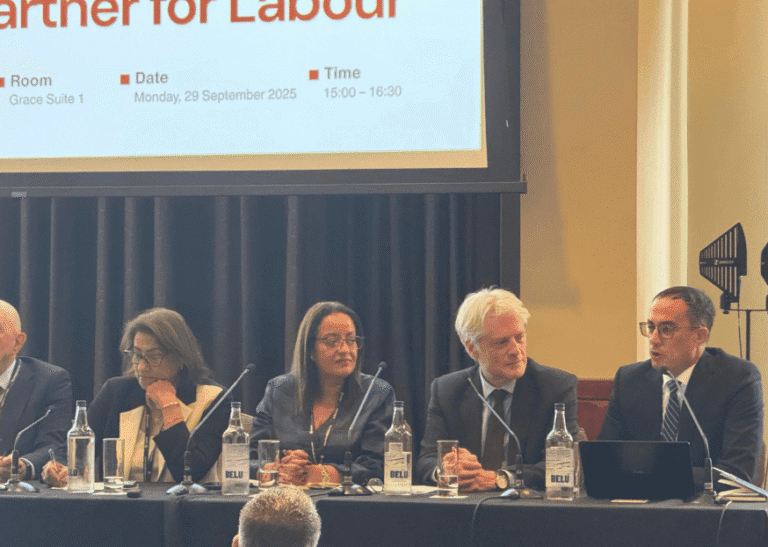
From bustling conference halls to quiet university corridors, the Nordic Center for Conflict Transformation (NCCT) continues to strengthen its footprint on the global stage. Led by Executive Director Noufal Abboud, a recent mission to the United Kingdom showcased NCCT’s unique approach to peacebuilding—where research, diplomacy, and collaboration converge to drive sustainable impact.
The visit began in Liverpool, where Mr. Abboud participated in the UK Labour Party Conference as a keynote speaker. Addressing an audience of policymakers, diplomats and business leaders, he highlighted how models of development diplomacy and social progress as a foundation for stability and inclusive growth. His remarks drew attention to the value of pragmatic cooperation between North Africa and Europe, illustrating how peace can be fostered through partnerships grounded in trust, shared values, and mutual prosperity.
From there, the journey moved to the University of Bradford, home to one of the world’s most respected centers for peace studies. In a series of high-level meetings with Professor Owen Greene, Dr. Serag El Hegazi, Dr. Clara Voyvodic, Dr. Sudhir Selvaraj, and Dr. Alex Waterman, discussions centered on advancing research collaboration between NCCT and the Division of Peace Studies and International Development, as well as the John & Elnora Ferguson Centre for African Studies (JEFCAS).
The exchanges explored how NCCT’s field-based experience could complement Bradford’s academic depth, opening new pathways for joint research, training, and policy engagement. “The partnership between NCCT and Bradford University embodies what peacebuilding should be,” Mr. Abboud noted. “It’s about linking local realities to global knowledge, ensuring that lessons from the field inform theory, and that research translates into tangible action.”
The final leg of the visit took place in London, where Mr. Abboud met with Steve Killelea, Founder and Executive Chairman of the Institute for Economics and Peace (IEP). The meeting reaffirmed the strong collaboration between the two institutions, which have long worked together on evidence-based approaches to conflict transformation. Both Mr. Abboud and Mr. Killelea emphasized the need to bridge data and dialogue, turning empirical insights into tools that policymakers and practitioners can use to build lasting peace.
Across the United Kingdom, these engagements underscored NCCT’s growing role as a connector – linking research and practice, academia and fieldwork, local experiences and international policy. By cultivating strategic partnerships rooted in mutual learning, NCCT continues to advance its mission: transforming conflict through collaboration and shaping a more peaceful, interconnected world.